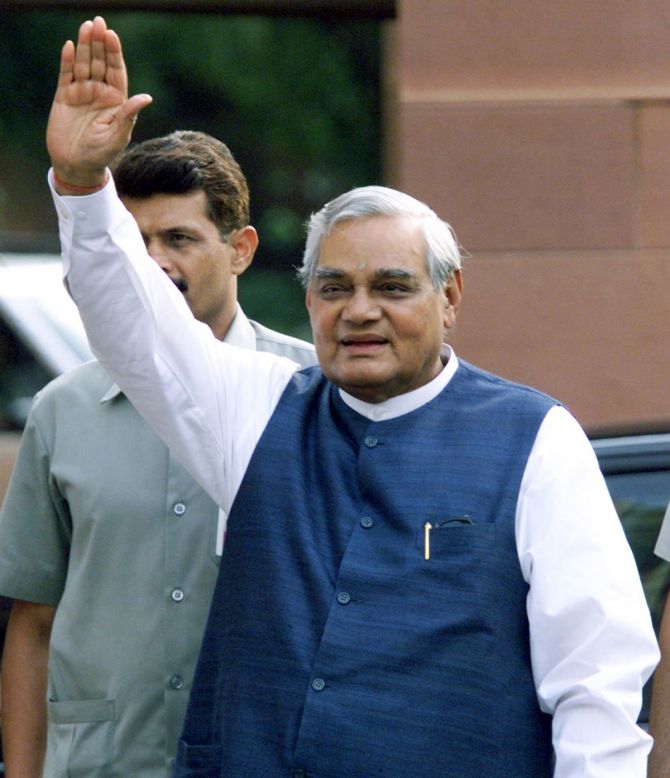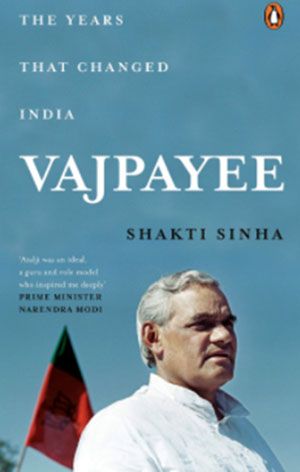'When economic policies were attacked by people on his own side, he went ahead despite all the criticisms in the coalition, within the party and the Sangh Parivar.'

"Losing the vote of confidence by a single vote, and then being able to recover and run the government during the Kargil War was a very difficult time," recalls Shakti Sinha, then private secretary to then prime minister Atal Bihari Vajpayee and author of Vajpayee: The Years That Changed India, a fascinating book on that era in Indian history.
"He was a caretaker prime minister conducting a defensive war. He had to be careful that he was fighting for India and not the party. He managed to do that and the country appreciated it," the retired IAS officer who also served as director of the Nehru Memorial Museum and Library adds.
Currently director of the Atal Bihari Vajpayee Institute of Policy Research, MS University, Vadodara, Sinha spoke to Rediff.com's Archana Masih about Vajapayee's politics and how India changed under his stewardship.
One of the things that comes across in your book is that Mr Vajpayee had this gift of striking good relations with political opponents. You mention then Kerala chief minister E K Nayanar, even though they were inhibited by language.
Could you share your thoughts on his relations with his political opponents?
Mr Vajpayee was not a very talkative person. He was more of a listener and played close attention which made him get along with people.
He was reserved and quiet, but had a good sense of humour, good turn of phrase and a twinkle in the eye.
Not only Mr Vajpayee, but that generation of politicians across the spectrum were very comfortable dealing with each other personally, regardless of their ideological points.
Alhough even at that time, some politicians had started changing and you could sense the cold vibes.

Who were some of the leaders from different parties that Mr Vajpayee had good relations with?
I worked with him for three-and-half years, while his political life exceeded 50 years.
I mention E K Nayanar because despite the massive language problem, I have seen him (the Marxist chief minister) literally pull up his mundu, roll his socks down and show his varicose veins and discuss his discomfort while walking.
The other name that comes to mind is Mr Digvijay Singh, the then chief minister of Madhya Pradesh. He was himself very warm in his dealings with Mr Vajpayee.
Many politicians from opposite parties were comfortable with each other and it was not unusual. But there were some who were uncomfortable and carried their ideology into the personal space also.

You write about some of the landmark events in our national life that Mr Vajpayee presided over -- the nuclear tests, the bus to Lahore, Kargil War. What are the top five ways in which India changed under his stewardship?
To quote the language of Formula One racing, he led the BJP to the pole position of Indian politics. This was the first genuine non-Congress government in Indian history.
1996 marks the moment when BJP replaces the Congress as the pole position of Indian politics. Even though in some later elections, the Congress won more seats than the BJP, post-1996, governments were either formed by the BJP or formed with the express purpose of keeping the BJP out.
Secondly, he achieved the dream of crossing the nuclear threshold to secure India.
China was already a nuclear country. China and Pakistan had a nuclear and missile collaboration. International agreements like the Nuclear Non Proliferation Treaty and the CTBT had shut the door on India becoming nuclear, but he was determined that India had to cross the nuclear threshold.
Third, the unprecedented outreach to Pakistan. He took the plunge and went to Lahore. Even at the height of the Kargil war, he tried to sort it out with the Pakistan prime minister. He showed remarkable political courage.
His conduct also told the world that India is a different country and between the two nuclear neighbours, India was a responsible country wanting to defuse the situation.
Vajpayee's leadership showed that India should not be hyphenated with a gunslinger country like Pakistan, which was willing to risk a nuclear war.
Fourth, he acknowledged that the world had changed after the end of the Cold War and that India had no big friends. He opened up to America by calling it India's natural ally.
Despite the sanctions imposed on India after the nuclear tests, Vajpayee realised that in a changed world, India and America must be on the same side. There should be a substantial convergence of interests and values.
Lastly, the robust and responsible conduct of the Kargil war. Despite being a nuclear country, he did not expand the war and yet not rest till every intruder was ousted from every inch of Indian territory.

Looking back, even his opponents think of him as a statesman now rather than just a BJP prime minister. What are some moments where he behaved as a statesman?
In his day he was not considered a statesman by his political opponents. They called him a fascist with a hidden agenda and anti-minority.
He behaved like a statesman in his leadership of the Kargil War. He knew that as a nuclear weapons State there were certain things, he could do and certain things he could not.
When America imposed sanctions after the (nuclear) tests, he realised America's domestic compulsions, but also understood that ultimately India and America must stand together.
He had the courage to state that in public, even though America called India a rogue. He said India had done the tests in self-interest and ultimately our two countries must work together.
He had the ability to look beyond the immediate and the long term.
The tough sanctions and fallout of the nuclear tests or losing that vote of confidence by a single vote, what do you think was his toughest moment?
He was determined about conducting the Pokharan tests.
I think, losing the vote of confidence, and then being able to recover to run the government during the Kargil War was a very difficult time.
He was a caretaker prime minister and conducting a defensive war where he had to be careful that he was fighting for India and not the party.
He managed to do that and the country appreciated it even though his opponents attacked him during the Kargil War. It is also the first time in history that the Opposition was attacking the government for the conduct of the war.
Yet, he remained the prime minister and not a member of the BJP during the war.

How did he deal with the lows of prime ministership?
I can't vouch for what was going in his mind. In his long political life, I guess, he went through many, many lows. I feel the experience he gained by sitting in the Opposition benches for such a long time allowed him to be confident even when he lost power -- for him, life did not end with that.
To him, power and life were not synonymous.
He had tremendous self-confidence -- not to the point of arrogance, but the self-belief that he could do it and come back.

You also say that inside a soft exterior, he was a man of steel. Can you share any incidents that reveal that facet of Mr Vajpayee?
When economic policies were attacked by people on his own side, he went ahead despite all the criticisms in the coalition, within the party and the Sangh Parivar.
On the other hand, even people supposedly defending him crossed the line to attack the Sangh. He was not prepared to accept that either.
He felt the differences within the family should be sorted out in the family and not taken outside.
Once he took a decision, come what may, he would not waver. Otherwise, he went along with people. He was very conscious of the fact that he should carry the party with him.
I noticed finally after all the consultations, discussions and disagreements, once he arrived at a decision then he was not willing to compromise.
In his political life when anyone crossed the line beyond a point -- like when he was called a mukhauta -- he was very strong and did not compromise.
Feature Presentation: Aslam Hunani/Rediff.com









